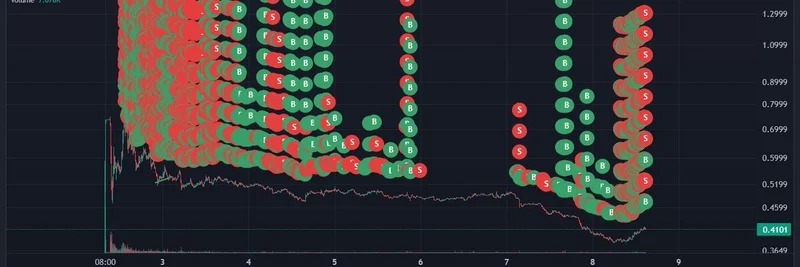In the fast-paced realm of cryptocurrency, where fortunes can flip in minutes, market makers play a crucial role in providing liquidity. But what happens when they're accused of turning the tables on everyday traders? A recent tweet from crypto commentator MartyParty has sparked debate, claiming that Wintermute, a prominent market-making firm, is engaging in predatory tactics on the DoubleZero ($2Z) token via Raydium, Solana's popular decentralized exchange (DEX).
For those new to the scene, Wintermute is a heavyweight in the crypto space, often hired by centralized exchanges (CEXs) to manage liquidity and stabilize prices. However, MartyParty alleges they're doing the opposite: manipulating prices to liquidate traders' positions and extract profits. This isn't just idle chatter—it's backed by a chart showing buys (green "B" bubbles) and sells (red "S" bubbles) exclusively from the Raydium pool.
The chart, shared by @eastrnsamurai in the quoted post, paints a picture of aggressive selling that coincides with price drops, potentially forcing leveraged traders into liquidation. MartyParty emphasizes that this is only part of the story, as Wintermute operates across multiple liquidity pools. "Traders go long, the market maker is hired to sell down and liquidate them all," he writes, calling it "predatory and immoral."
DoubleZero ($2Z) itself is an intriguing project. It's not your typical hype-driven meme token but a utility-focused one powering a decentralized network designed to boost blockchain validators by reducing latency and jitter through a global mesh. Launched on Solana's mainnet-beta, $2Z supports payments, staking, and rewards within its ecosystem. Recently listed on major platforms like Bybit and Crypto.com, it saw an initial surge but has since dipped below $0.40 amid heavy selling—possibly tied to these allegations.
Why does this matter for meme token enthusiasts? While $2Z leans more toward DePIN (Decentralized Physical Infrastructure Networks), the manipulation tactics described here are rampant in the meme coin world. Low-liquidity pools on DEXs like Raydium make it easy for big players to sway prices, leading to rug pulls, pump-and-dumps, or forced liquidations. If you're trading Solana memes, spotting these patterns could save your portfolio.
Understanding Market Manipulation in DeFi
Market manipulation isn't unique to crypto, but DeFi's transparency—thanks to on-chain data—makes it easier to spot. Tools like DexScreener or TradingView (as used in the chart) allow anyone to track wallet activities. In this case, the stacked sells during price declines suggest coordinated dumping, which could violate fair trading principles if proven.
Wintermute hasn't publicly responded to these specific claims, but as a firm, they've been involved in high-profile liquidity provisions for tokens across chains. Remember, market makers are supposed to bridge bids and asks, not exploit them. If these accusations hold water, it could prompt calls for better regulation in DeFi.
Tips for Traders to Avoid Liquidation Traps
If you're diving into tokens like $2Z or similar Solana projects, here's some practical advice:
- Stick to Spot Trading: As one reply to the tweet noted, leveraged trades can get wiped out even with low leverage. Buy spot to hold through volatility.
- Monitor On-Chain Activity: Use explorers like Solscan to watch large wallet movements. If a known market maker starts heavy selling, it might be time to reassess.
- Diversify Liquidity Sources: Don't rely solely on one DEX pool. Check multiple venues to gauge true market sentiment.
- Set Stop-Losses Wisely: But be cautious—manipulators might hunt stops to trigger cascades.
This incident highlights the double-edged sword of crypto: innovation meets opportunism. For more insights on navigating meme tokens and DeFi pitfalls, check out our knowledge base at Meme Insider. And if you want to see the original discussion, head over to the tweet here.
Stay vigilant, traders—the blockchain never sleeps.



